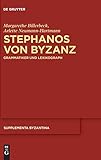Stephanos von Byzanz : Grammatiker und Lexikograph / Margarethe Billerbeck, Arlette Neumann-Hartmann.
Material type: TextSeries: Supplementa Byzantina : Texte und Untersuchungen ; 12Publisher: Berlin ; Boston : De Gruyter, [2021]Copyright date: ©2021Description: 1 online resource (X, 312 p.)Content type:
TextSeries: Supplementa Byzantina : Texte und Untersuchungen ; 12Publisher: Berlin ; Boston : De Gruyter, [2021]Copyright date: ©2021Description: 1 online resource (X, 312 p.)Content type: - 9783110726855
- 9783110727739
- 9783110727678
- PA4435.S63 B55 2021
- online - DeGruyter
- Issued also in print.
| Item type | Current library | Call number | URL | Status | Notes | Barcode | |
|---|---|---|---|---|---|---|---|
 eBook
eBook
|
Biblioteca "Angelicum" Pont. Univ. S.Tommaso d'Aquino Nuvola online | online - DeGruyter (Browse shelf(Opens below)) | Online access | Not for loan (Accesso limitato) | Accesso per gli utenti autorizzati / Access for authorized users | (dgr)9783110727678 |
Frontmatter -- Vorwort -- Inhalt -- Einleitung: Leben und Werk des Stephanos -- 1. Teil: Das grammatische Erbe -- 2. Teil: Lexikographie als Kulturwissenschaft -- 3. Teil: Die Rezeption der Ethnika -- Anhang -- Literaturverzeichnis -- Indices -- Addenda und Corrigenda
restricted access online access with authorization star
http://purl.org/coar/access_right/c_16ec
Die Monographie versteht sich als Begleitband zur fünfbändigen Ausgabe der ,Ethnika‘ (2006–2017) und will gleichzeitig das Lexikon einer breiteren altertumswissenschaftlich interessierten Leserschaft erschliessen. Unter Justinian als ‚Grammatikos‘ an der Kaiserlichen Hochschule in Konstantinopel tätig, beschliesst Stephanos die Tradition der alexandrinischen Philologie und fasst das gelehrte Erbe der Antike nochmals zusammen. Aufgefächert nach thematischen Aspekten, wie Attische Demen, Eponyme und Namensetymologien, Gründungslegenden, Umbenennungen verzeichneter Städte, berühmte Bürger, Mirabilien und Proverbien, stellt der Band den kulturwissenschaftlichen Informationsschatz der ,Ethnika‘ vor, auch wenn diese bloss in einer verkürzten Fassung auf uns gekommen sind. Die Rezeption des Lexikons in mittelbyzantinischer Zeit und in der Renaissance wird anhand von Eustathios, Ermolao Barbaro, Erasmus und weiteren belesenen Autoren nachgezeichnet.
The Ethnica by Stephanus of Byzantium constitute a dictionary of geography and cultural history from the Justinian period that has been transmitted to us in abridged form. They record place names and terms of belonging (ethnica), generally using "es from source authors. Alongside their value as a source of lexicographical information, where authors' works have been lost, the Ethnica are hugely significant as a source of fragments.
Issued also in print.
Mode of access: Internet via World Wide Web.
In German.
Description based on online resource; title from PDF title page (publisher's Web site, viewed 28. Feb 2023)


